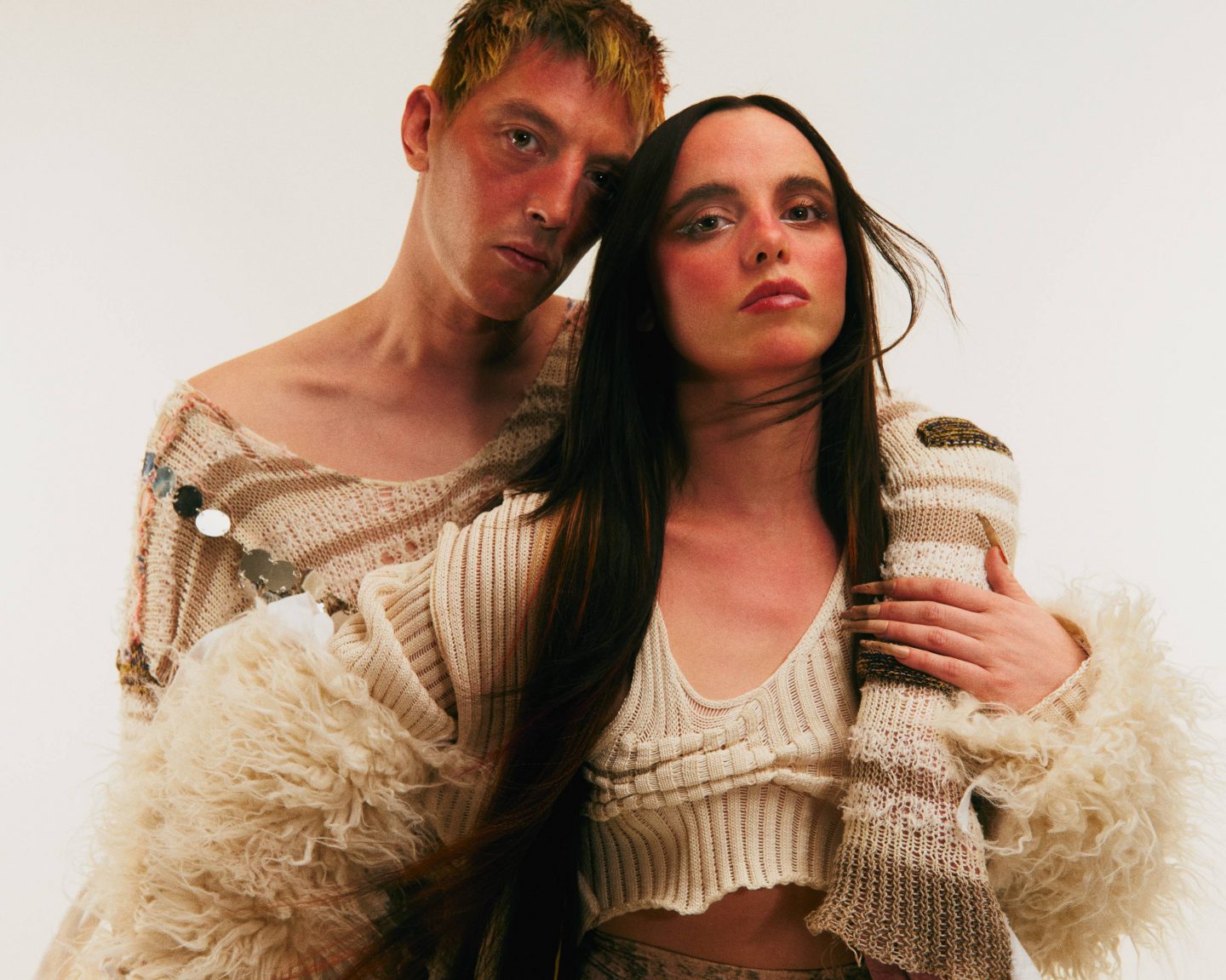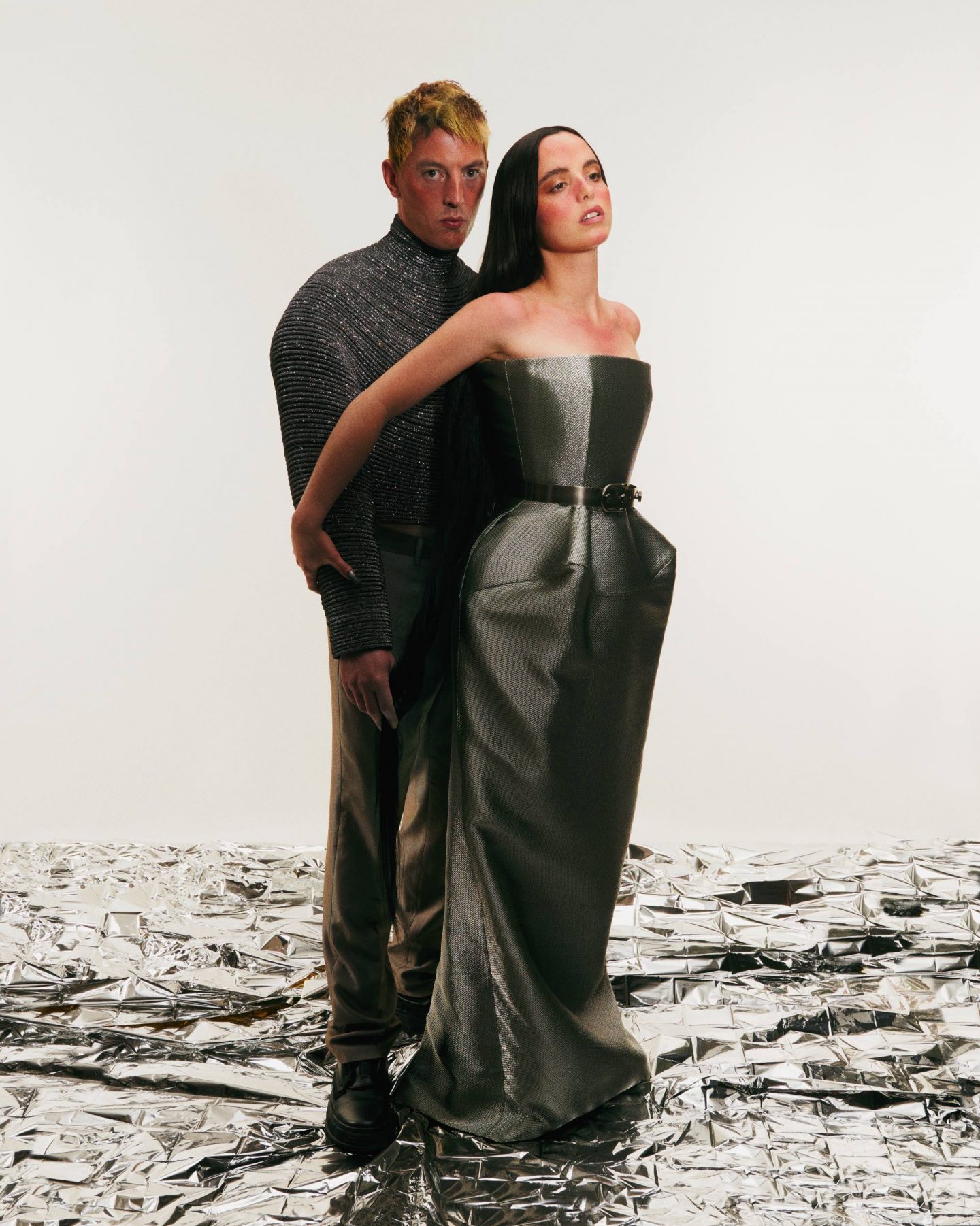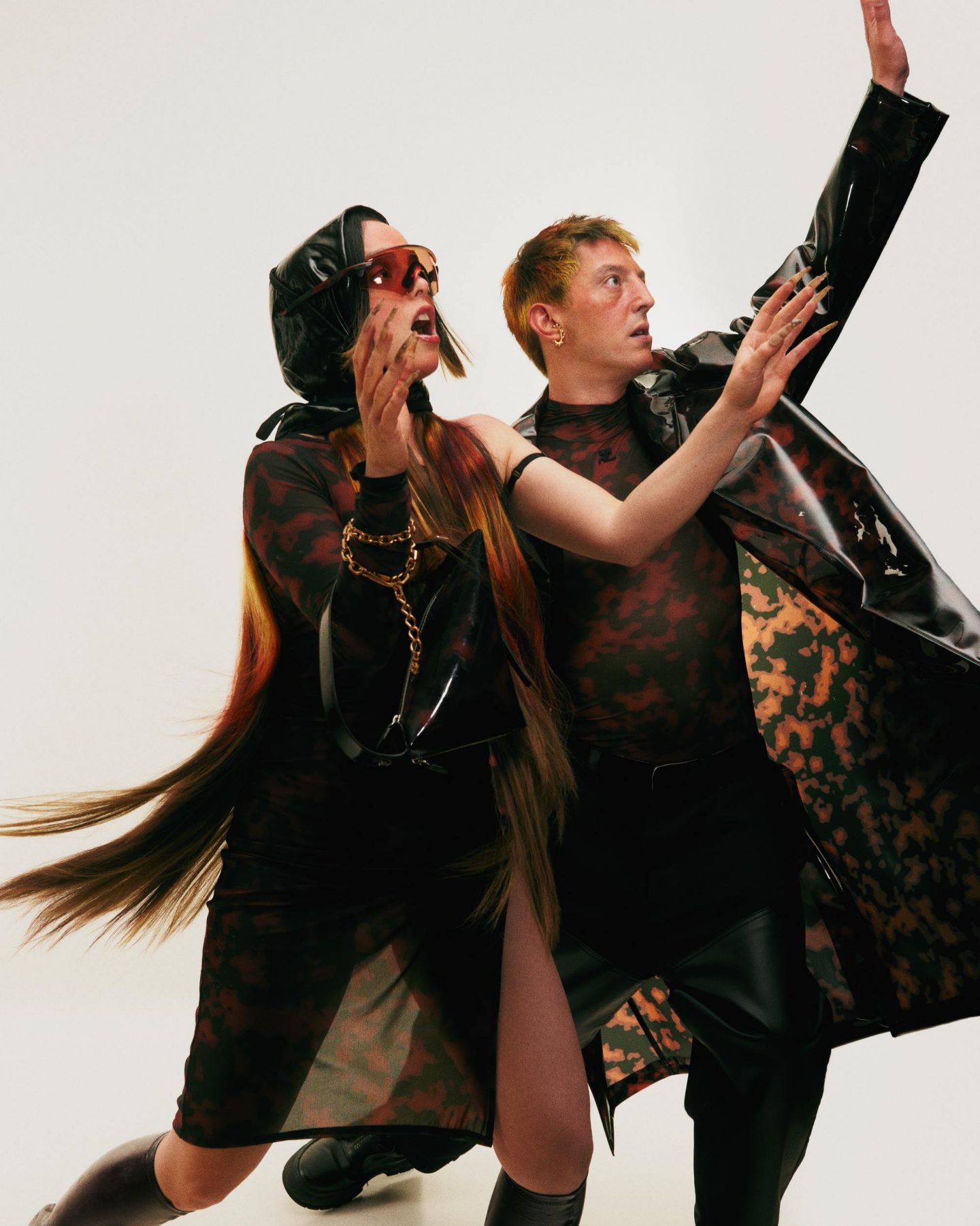
IN CONVERSATION WITH SOPHIE THATCHER
Sophie Thatcher, best known for her role in the critically acclaimed series…
Photography by Jason Renaud; Interview by Louise Garier




“Une Nouvelle Chance is a moment in which we’re saying everything from the past is behind you, so you have to start something new.”
We sat down with Paul Orzoni and Mathilde Fernandez of the dynamic young group ascendant vierge to discuss their unique fusion of genres, their collaborative process, and the release of their debut album Une Nouvelle Chance. Since meeting over three years ago, the duo’s music, and especially their hit song “Influencer,” has resonated with millions. Paul, a former hip-hop producer and member of the hardcore techno gabber group Casual Gabberz, and Mathilde, a lyrical goth-pop singer-songwriter, are a match made in heaven. As they embark on their tour, the duo reflects on their journey thus far, the joy of sharing their music, and what’s to come.
Mathilde: In astrology, you have two signs: the first is the sign from the sun, and the second sign, which is “ascendant” in French. In English it’s “rising,” so Virgo Rising.
Paul: Most of the time I try to be super simple: we do music and Mathilde sings. I say that we make songs and we’re influenced by electronic music, trance, and techno, but I never start with it.
Mathilde: For sure, I mention electronic music and a lot of influences from hardcore to New Wave to pop.
Mathilde: I was looking for people to do a remix on my solo album called Hyperstition in 2019. I had discovered Paul’s music a few times before and fell in love with his style and his musical personality. So, I wrote to him on social media saying “Hey, would you be interested in remixing one of my songs?” and he replied directly, “Oh, yes!”. Twenty-four hours later I had this amazing remix in my mailbox. I was very shocked, in the best way, because this guy had been so efficient, and the song was literally the best song on my album. So, we met up, because I lived in Brussels and he lived in Paris, and we decided to keep working together. On the second appointment, maybe a few weeks later, we decided to create a band from scratch, something where we could express everything without limits. Because he has his style, I’ve got mine, so let’s create something.
Paul: The process is pretty classical, we bounce stuff back and forth. Most of the time, I send Mathilde a track I’ve started, trying not to push it too far in terms of construction, trying to just keep the main idea. Mathilde, when she likes it, starts to sing top lines, in gibberish (“yaourt,” in French), to find the vocal lines. She then writes the text, and we arrive at a demo. I then go to see Lucien, our sound engineer, and a producer, someone who has a broad vision of the musical landscape. He knows how to get that song, that feeling. In the second phase, we work with British sound engineer Geoff Swan, who actually works a lot in the hyperpop scene and with artists like Caroline Polachek and Charli XCX. He also helped us find this clarity in the vocals. You can really hear and understand Mathilde’s voice while keeping the music’s heartbeat and presence, which is a real technical challenge.
Paul: I think it’s not only about us. A lot of the music that has been made in the last 20 years has a lot of samples. For us, it’s all about curation, mix, hybridization…
Mathilde: and blending of genres.
Paul: It’s a word that’s not often used in the music world, but in art we talk about postmodernism. We’re trying to do something that has been done a lot in pop music: integrate elements from more niche genres with what’s appealing to us, which is trance and hardcore, for example.
“In our music, I’m not trying to show that I’m a big producer. The music is well produced, but I’m not overproducing, there’s not always a lot of complexity.”
Paul: Sometimes we are a bit tired of easy labeling like hyperpop. A lot of people use the word and they don’t even know what they mean exactly.
Mathilde: Yeah, this is a problem. Many people label things with words that they don’t really get. Hyperpop is a niche, a crew of friends in the UK, who play with the structure, often synthesizing melodies and voices with Auto-Tune. You never hear a pure voice. For me, the fact that we are not transforming the voice means that we absolutely cannot be included in hyperpop. But I also understand why our music can be put in a hyperpop playlist, and there’s no problem with that, but we cannot give ourselves that label.
Paul: Even though the styles we use are pretty contemporary, our approach is old school in terms of arrangement, composition, structure, and effects. In our music, I’m not trying to show that I’m a big producer. The music is well produced, but I’m not overproducing, there’s not always a lot of complexity. Mathilde’s voice is so unique, it would be stupid to overproduce it.
Mathilde: Yeah, of course. It’s like when you cook, and finally add some spice, but not so much.
Paul: It was such a strange period of time for everyone, and as a new band, you want to release your music to the world and do shows. Basically, we released the first songs and did two or three shows, and boom, first lock down. At the time, we were already thinking about releasing the first EP, but we were like, shit, we can’t release it in that moment. The pandemic helped us get really deep inside our feelings, emotions, and it’s always good as an artist to be able to get that out. In the moment, of course, it was shit, but again, I think it was good for us. Also, the fact that we released “Influencer” right before the pandemic helped the song to stay new for two years.
Mathilde: It’s very strange. Even if it was terrible what was happening, this moment was a crazy chance for us. Time stopped and there were very few releases. When you can’t go out, you think back to the last party you had. People were reliving their last parties again in their mind, parties with “Influenceur” and especially with “Faire et Refaire,” which dropped in December, right before the lockdown. So as time stopped, people kept dancing to the same music and the whole context of our music changed. People tell us after our shows that, after singing, dancing, and moving a lot, almost like a sport, they feel washed from the inside. I guess our music helped a lot of people to keep going in that weird time.
Paul: There’s also a part we just can’t explain, we were the first to be surprised and overwhelmed. Every weekend, we received videos of illegal parties and house parties where they were playing “Influenceur.” We witnessed the song going up and up. More and more people are actually still discovering the song, which is a bit weird for us after two years (laughs).
Paul: At some point the EP was behind us and we thought it was time to do an album.
Mathilde: To start the album, we went together to Normandy. The first songs we made were “À l’Infini,” and “Une Nouvelle Chance”
Paul: –and “Ce monde où tu n’existes pas”–
Mathilde: Ah, but this came later.
Paul: She doesn’t have the same timeline that I have. I do the production, and sometimes I wait months for the track (laughs).
Mathilde: It’s true that doing this, we sometimes completely lose track of time. We mix one year with the other. It is quite a blurry era for us. But yes, we first worked on “À l’Infini” and “Une Nouvelle Chance,” and then very quickly later, Paul created “Ce monde où tu n’existes pas” and “Petit Soldat” on the same day.
Mathilde: In the album, in terms of lyrics and sense, you have more or less three major themes. There’s a pretty euphoric side in songs like “À l’Infini,” “Je suis un avion,” “Slowlita,” “Aimer sur le long terme,” and “IRL”: you can hear them and feel pushed up, a bit like “Influenceur.” These songs are something that can help, they’re motivational. We live in kind of a shitty world, nothing is going well, but you have to keep going, even if you’re shy, even you’re ugly (laughs), even if you’re having problems. This is the first theme. Then you have the melancholic as well as the ruptured sides. It’s often a song that will take something sad but, at one point, you have a change, a twist. For example, the song “Petit Soldat” is about resistance, rebellion, and trying to enlighten spirits. It’s saying, hey, people are walking on your face! A wake-up call of sorts.
Paul: Une Nouvelle Chance is a moment in which we’re saying everything from the past is behind you, so you have to start something new. It can be sad thinking about your life, but it’s also a great moment.
Mathilde: It’s also full of promise. When I wrote “Une Nouvelle Chance” itself, the song, I was playing around trying to write a poem in the way of Celtic, or traditional songs from Brittany. The lyrics are about post-modern humanity, and I was playing with ideas of change, motivation, and poetry.
Paul: It’s changed quite a lot.
Mathilde: It’s like if you ask two parents which kid they prefer. Of course, one is more joyful, one is much more of an artist (laughs).
Paul: At the moment, there is one song that took me a while to like because it was super hard to get the right version. It’s “Au Top,” a collaboration with Aamourocean. It was a lot of work and was a pretty ambitious song because we go from piano to psytrance to symphonic orchestra. I was super proud of it, but I wasn’t sure about it until we started playing it live. Then I started enjoying it again.
Mathilde: Yes, same as Paul. I was a bit more in doubt with the songs “Défi,” and especially “Slowlita.” It made me cringe a little bit because it’s maybe too joyful, and I feel better when it’s very dark and melancholic. But now I’m so happy to perform it live.
Paul: Visuals are important for both of us. We have a certain nostalgia of buying CDs and vinyls and we still really value covers, credits, and the concept of an album. It’s not something where you can just stream one song. The momentum of when you buy a CD, when you get it for the first listen, is something that’s always brought me to music. As for the visual part, and the videos, it’s just something we like. For us it was natural, another territory to express ourselves.
“For the album, we asked ourselves how we can be warmer, not always super stylish.”
Paul: I think it was there from the start in Mathilde’s lyrics, like in “Influenceur,” for example. The song is a criticism, but at the same time it’s a little bit of fun and sweetness. This is something that we, however, didn’t capture at first in our imagery. So, for the album, we asked ourselves how we can be warmer, not always super stylish. We wanted to present another part of us without going into a weird and awkward social media thing… “Heyy it’s Paul and Mathilde, blah blah blah…” So, we tried to think about a creative way to show another part of ourselves. We like to have fun! (laughs)
Mathilde: We like to make jokes! So we found some people who could help us show this aspect visually.
Paul: What’s great in Mathilde’s lyrics is that they aren’t so direct. It can be a rebellion song for many different people and rebellions. For example, with Casual Gabberz (Paul’s hardcore techno/gabber group), we did a song called “F le 17” (F the police), which is very straightforward. Of course, people used the song in protests. But with “Petit Soldat,” it’s something more subtle.
Mathilde: It’s also funny because, for me, if I were to go to a protest, I would definitely play “Petit Soldat,” which is exactly about it. But most of the videos we receive from protests are of “Influenceur.” So there’s no rules (laughs). In our songs, there are different meanings, different layers, and you can actually hear and understand whatever you want. Not on every song, but on many.
Paul: It’s going to sound really cliché, but being able to share something that comes from you, sharing your music and seeing the response of a big crowd.
Mathilde: When the audience sings the songs it’s unreal.
Paul: And even with songs that I can barely listen to anymore, like “Influenceur,” I take a lot of pleasure from performing them.
Mathilde: I’m personally completely grounded in the present. The future is tomorrow for me, and I stop there. One week, max.
Paul: Maybe I overthink, but I think a lot about what the next step is, even though I may have no clue.
Mathilde: At the moment, we haven’t stopped working on this album. We’ve been focused on the release of the album and the start of the tour. We can’t wait to go back to the studio and work on music. We start to feel the urge.

Sophie Thatcher, best known for her role in the critically acclaimed series…
Photography by Jason Renaud; Interview by Louise Garier

"We have to create something that has a purpose and is useful. And not forced by the…
Interview Carolin Desiree Becker

Supporting Sydney’s cultural scene: This month’s collaboration reminds us of happy…
Interview by Sina Braetz